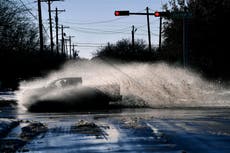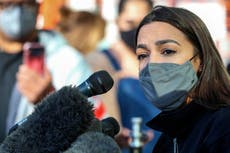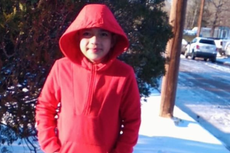Men and women are freezing in Texas jails – where is the political will to do something about it?
If states and the federal government truly care about the health and safety of our most vulnerable citizens, then incarcerated people must receive the same treatment afforded to nearly everyone else

The snowstorm raging right now in Texas has shown again how poorly incarcerated people are treated, not just in that state, but throughout the country.
As the storm continues to batter Texas, incarcerated men and women in Harris County jail are trapped in deplorable living conditions. Without access to electrical power, heat or food, they are freezing and living without running water or money to pay for their commissary – depriving them of the basic human rights and dignity the rest of the United States enjoys.
We’ve seen this before. Time and again, incarcerated people – who are disproportionately Black and Latino – are treated as forgettable and disposable in the United States. They are men and women – our brothers, our sisters, our spouses – who have been charged to the care of the state, but their lives are at risk.
And now, with the added threat of Covid-19, incarcerated people’s lives are even more threatened. Indeed, according to reports, more than 230 people have died from Covid-19 in Texas correctional facilities. In county jails, the overwhelming majority were never convicted of a crime.
Let’s be clear: political and governmental resistance to climate change continues to jeopardise human lives. For example, during Hurricane Katrina, there was no plan to evacuate anyone from Orleans Parish Prison. As that storm rolled through, the facility flooded rapidly, cutting off the vulnerable people inside from food and safe drinking water. Hundreds of people were trapped in filthy conditions for days, and then released with nowhere to go.
Three years later, in Galveston, Texas, 1,000 people incarcerated at the Galveston County Correctional Facility were left to die behind bars during Hurricane Ike – even while local animal shelters were evacuated before the storm. In virtually every case, there were no emergency plans in place for responding to these disasters.
Without emergency plans, incarcerated people have always been more susceptible to danger. With Covid-19, there are no social distancing techniques in prisons and jails. Supplies such as masks, sanitiser and soap are scarce. Medical testing is inadequate. As a result, these people are four times more likely to become infected than people in the general population. Their Covid-19 mortality rates are higher than people outside of correctional facilities.
This must change. We know that the time for bold action is now. We know that what is needed to ensure the health, dignity and safety of incarcerated people are detailed emergency management plans for correctional facilities that will protect lives in any kind of crisis – from snow storms, to pandemics, to hurricanes, and beyond.
There can be no doubt that we are living in a state of emergency, and the need for legislators to adopt emergency management plans is more important than ever. Legislators like U.S. Senator Ted Cruz must do the work to save the people in their state, instead of abandoning them to warmer climates.
If states and the federal government truly care about the health and safety of our most vulnerable citizens, then incarcerated people must receive the same treatment afforded to nearly everyone else.
We must create solutions that would require the Department of Corrections to evacuate vulnerable people from correctional facilities and, when necessary, to decarcerate those in prisons and jails, including pregnant women, people with respiratory illnesses, those over 50 and those within two years of release. And we must institute solutions that demand humane medical treatment and vaccine education to those still behind bars, and abandon the use of solitary confinement as a failed means of keeping people safe.
The fact remains that all people deserve care and humane treatment. Legislators must live up to the values they espouse, and do the hard work necessary to institute new solutions that recognise our basic humanity, before the living conditions for incarcerated people get even worse.
DeAnna Hoskins is president and CEO of JustLeadershipUSA, a national justice reform organisation that seeks to cut the U.S. correctional population in half
She served as a senior policy adviser at the Department of Justice and as the director of reentry for Hamilton County (Ohio) Board of County Commissioners
Join our commenting forum
Join thought-provoking conversations, follow other Independent readers and see their replies
Comments



Bookmark popover
Removed from bookmarks